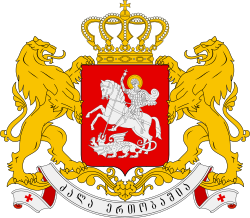| | |||||||||||||||||||||||||||||||||||||||||||||
| |||||||||||||||||||||||||||||||||||||||||||||
All 250 seats in the Supreme Soviet 126 seats needed for a majority | |||||||||||||||||||||||||||||||||||||||||||||
| Turnout | 69.59% | ||||||||||||||||||||||||||||||||||||||||||||
|---|---|---|---|---|---|---|---|---|---|---|---|---|---|---|---|---|---|---|---|---|---|---|---|---|---|---|---|---|---|---|---|---|---|---|---|---|---|---|---|---|---|---|---|---|---|
This lists parties that won seats. See the complete results below.
| |||||||||||||||||||||||||||||||||||||||||||||
 |
|---|
Parliamentary elections were held in the Georgian SSR on 28 October 1990, with a second round on 11 November. [1] They were the first free parliamentary elections in Georgia since 1919 and saw Round Table-Free Georgia emerge as the largest party in Parliament with 155 of the 250 seats. Voter turnout was 70%.
Contents
Round Table-Free Georgia MP Zviad Gamsakhurdia was subsequently elected by the Congress as Chairman of the Presidium of the Supreme Council on 14 November, effectively becoming the leader of Georgia.
The elections were the first in the Soviet Union in which the opposition groups were registered as formal political parties. [2] On 9 April 1991, the newly-elected Georgian legislature issued a declaration of Georgian independence from the USSR. [3]
